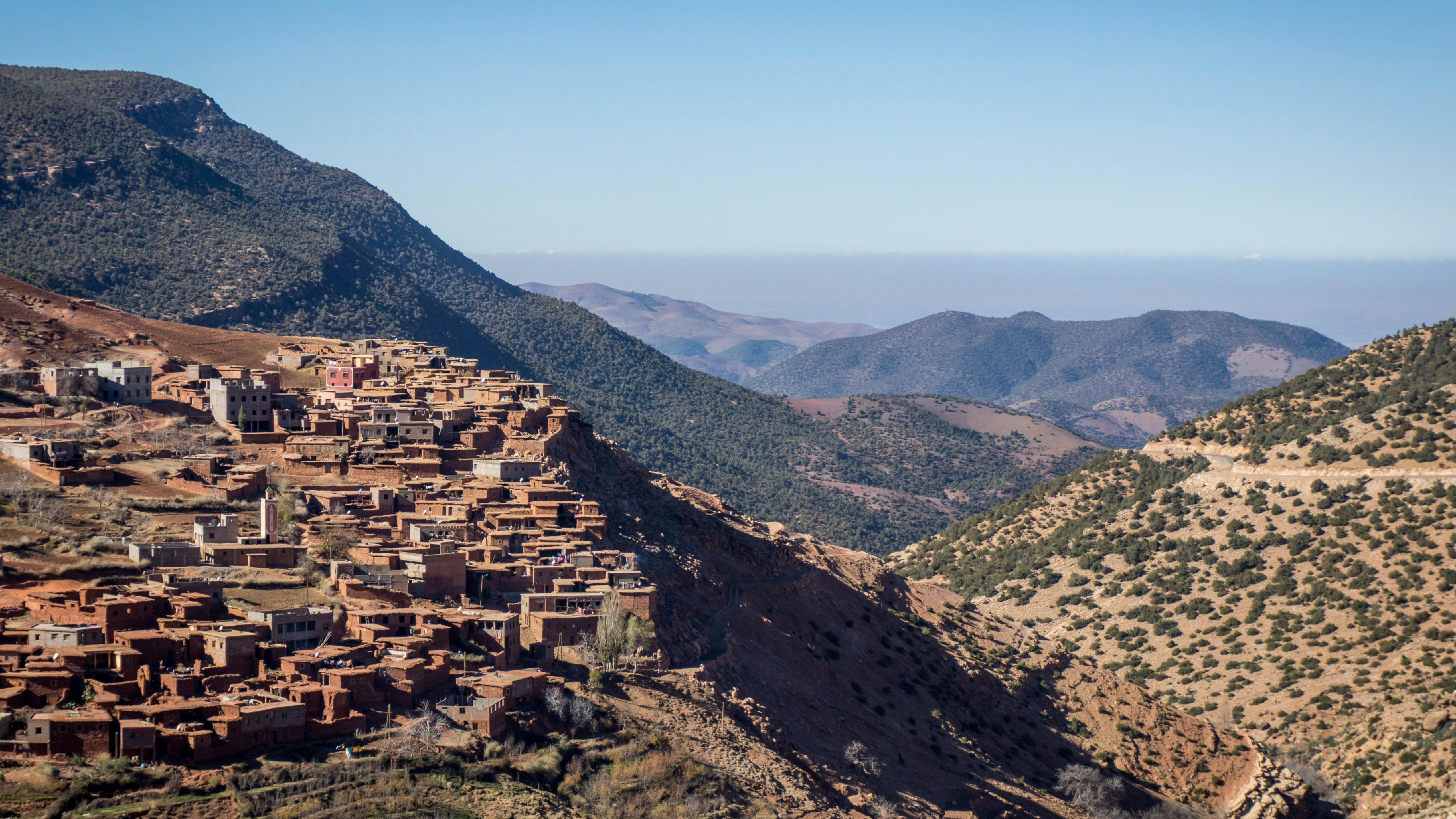
Curator’s statement
Morocco is a land of vibrant contrasts, where ancient traditions blend with modern life, and rugged landscapes stretch across the horizon. For travelers seeking an authentic and immersive adventure, trekking the Atlas Mountains offers a unique opportunity to not only explore Morocco's breathtaking natural beauty but also to delve deep into the rich and enduring Berber culture.
The Fora Difference
Book with Marc to access exclusive perks and experiences on your trip.
Killer perks
Free upgrades, spa credits and more—we got you
Personalized recs
Customized travel planning for your style
Insider knowledge
Expert advice from people who’ve actually been there
Where to stay in Morocco
Unlock perks by contacting Marc to book your trip.
Things to do in Morocco

Discovering the Atlas Mountains
The Atlas Mountains, stretching over 2,500 kilometers, serve as a majestic backdrop to Morocco’s diverse landscape. Rising above Marrakesh, the High Atlas range is home to some of North Africa’s highest peaks, including Mount Toubkal, which towers at 4,167 meters. But it’s not just the mountains’ raw beauty that attracts adventurers—it's the chance to journey through remote Berber villages, where centuries-old traditions still thrive.
Whether you're a seasoned hiker or a beginner, trekking in the Atlas Mountains offers routes for every level. Multi-day treks lead you through valleys, terraced fields and rugged mountain paths, all while encountering the warm hospitality of the Berber people along the way.
Meeting the Berber People: A cultural treasure
The Berbers, also known as the Amazigh, are the indigenous people of North Africa, with their roots tracing back over 4,000 years. As you hike through the Atlas Mountains, you'll pass through small villages that have remained largely untouched by time. This is where you can truly immerse yourself in Berber culture.
Stay in traditional gîtes (guesthouses) where you’ll be welcomed with mint tea, a symbol of Moroccan hospitality. In these homes, you'll get a firsthand look at the daily lives of Berber families. Learn about their age-old practices, from crafting vibrant textiles to tending terraced farms. The Berbers are known for their incredible artisanship, particularly in weaving, and you might have the chance to see how intricate rugs are made.
One of the most rewarding aspects of trekking in the Atlas Mountains is sitting down to share a meal with a local family. Meals are often centered around tagine—a slow-cooked stew of meats and vegetables seasoned with local spices. You’ll get a taste of not just the food but the traditions behind Moroccan cuisine, much of which is steeped in Berber history.
A journey through time: Berber traditions & folklore
While trekking through the Atlas Mountains, you’ll also encounter the spiritual side of Berber culture. Many Berber villages have shrines dedicated to local saints, and the region is rich with folklore and legends passed down through generations.
For centuries, the Berbers have practiced their own distinct form of Islam, blended with ancient animist beliefs. You might hear stories of djinn (spirits) said to inhabit the mountains or watch a fantasia—a traditional Berber horse-riding performance celebrating local festivals. These customs give travelers a glimpse into a way of life that has remained largely unchanged over millennia.
The adventure element: Hiking & exploring
While cultural immersion is one of the highlights of this journey, the adventure element is not to be underestimated. The Atlas Mountains offer some of the best trekking in North Africa, with stunning panoramic views at every turn. One of the most popular routes is the trek to the summit of Mount Toubkal, the highest peak in North Africa. Though challenging, the sense of accomplishment and the views from the top are unparalleled.
For those looking for less strenuous options, there are plenty of moderate hikes through the valleys and lower slopes. The Imlil Valley, a gateway to the High Atlas, offers stunning trails with waterfalls, rivers and picturesque Berber villages scattered along the way.
Where to stay: Traditional riads & mountain lodges
For a complete experience, combine your trek with stays in traditional riads and mountain lodges. In Marrakesh, before or after your adventure, spend a night in a beautifully restored riad—a traditional Moroccan house with an inner courtyard. Riads offer a peaceful escape from the bustling city streets, with intricate tile work, lush gardens and rooftop terraces.
In the Atlas Mountains, you’ll find cozy mountain lodges or family-run guesthouses that offer simple but comfortable accommodation. These lodges, built from local stone and wood, blend seamlessly into the landscape, providing the perfect base to rest after a day of trekking.
Practical tips for trekking the Atlas Mountains
When to go: The best time to trek the Atlas Mountains is during the spring (March to May) or fall (September to November). Summer months can be extremely hot, especially at lower altitudes, while winter brings snow to the higher peaks.
What to bring: Pack layers, as temperatures can vary greatly between day and night. A good pair of hiking boots, sun protection and a reusable water bottle are essential.
Hiring a guide: While some trails are marked, it's recommended to hire a local guide, especially for multi-day treks. Not only will they ensure your safety, but they'll also offer invaluable insights into the local culture and environment.
Conclusion
Trekking the Atlas Mountains and experiencing Berber culture offers travelers the rare chance to combine adventure with cultural immersion. As you hike through Morocco's rugged landscapes and connect with the warm-hearted Berber people, you'll walk away with a deeper understanding of the country's rich history and traditions. Whether you're summiting Mount Toubkal or sharing a meal with a local family, this journey is sure to leave a lasting impression on your mind and soul.
Embark on this journey, and discover how adventure and culture meet in the heart of Morocco.

Travel Advisor
Marc Scholnick

Get in touch with Marc
Did you like this guide? Reach out to customize and book your own experience. Or, just to chat about travel in general.
You can expect a response from Marc within 1–2 business days. You’ll also be subscribed to our traveler newsletter (you can unsubscribe at any time).
This guide is part of our ongoing series on travel to Morocco. Looking for more travel inspiration? Check out my guide, Exploring South America: A Guide to Small Ship Cruising.